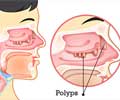People are at increased risk for developing rhinosinusitis from exposure to secondhand smoke, a new study has found.
People are at increased risk for developing rhinosinusitis from exposure to secondhand smoke, a new study has found.
The Henry Ford Health System study is believed to be the first time researchers evaluated the association between secondhand smoke and chronic rhinosinusitis.Chronic rhinosinusitis, or CRS, is a form of sinusitis in which the moist tissues of the nose and paranasal sinuses are inflamed for at least 12 weeks.
The findings are being published in the April issue of the Archives of Otolaryngology-Head and Neck Surgery.
"Our findings reaffirm the health hazards of secondhand smoke," says Amanda Holm, MPH, a co-author of the study and project manager in Henry Ford's Center for Health Promotion and Disease Prevention.
"The poisons found in secondhand smoke are quite an irritant to the sinus and nasal passages and are a major contributor to the development of rhinosinusitis."
Holm says primary care physicians and otolaryngologists should advise their patients to avoid secondhand smoke whenever possible.
Advertisement
SRM














